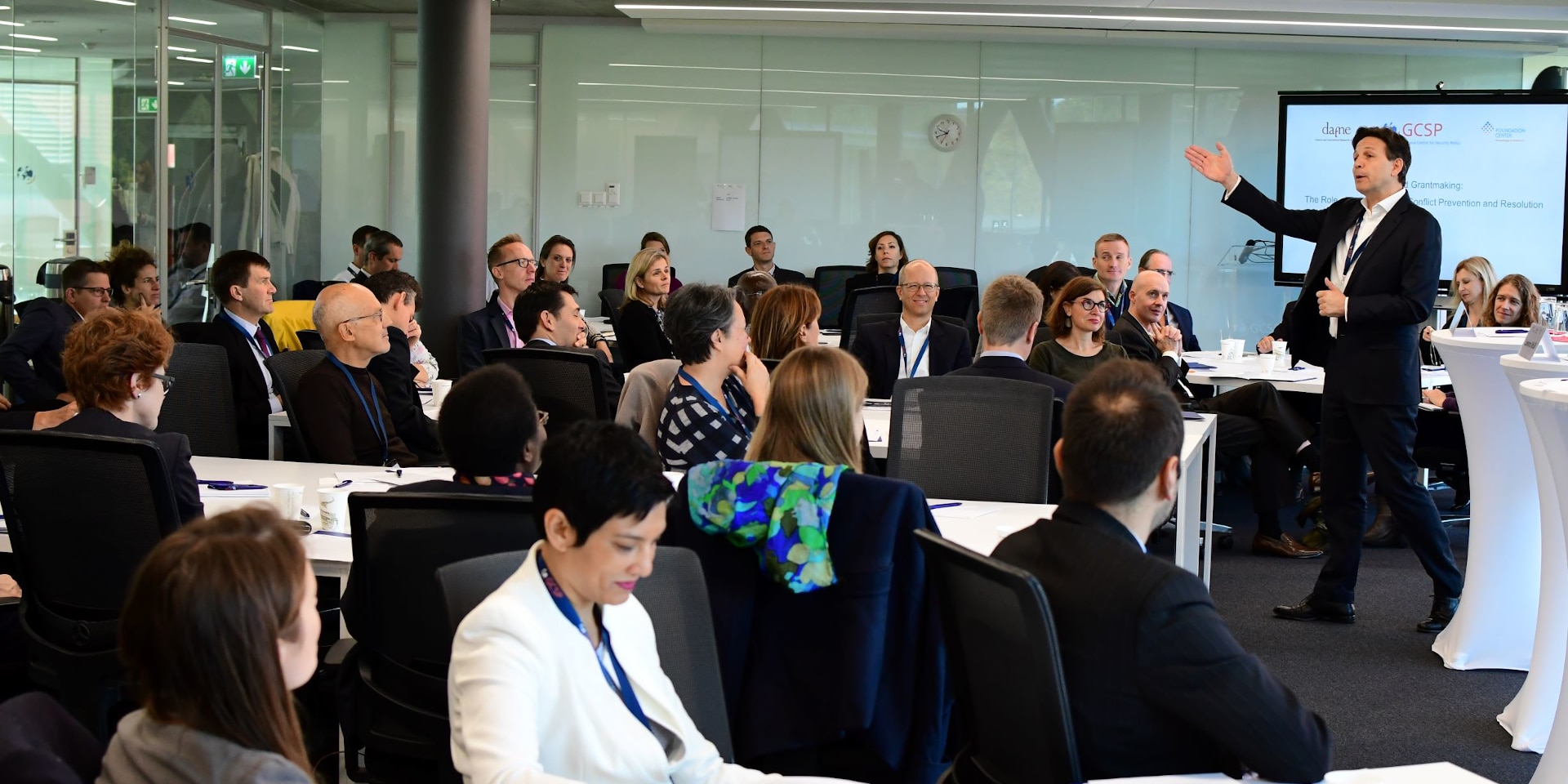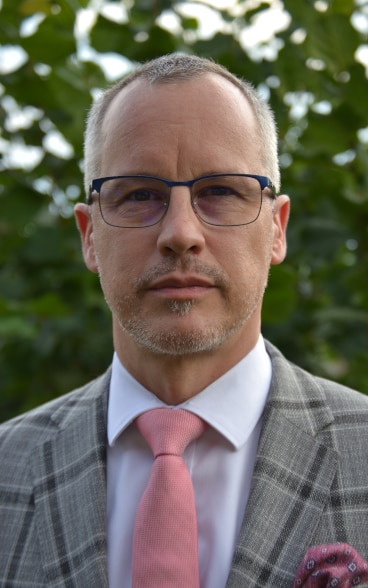Training for security actors builds peace: anniversary of Geneva centres
The three Geneva centres have been supporting global peace and reform processes for 25 years: using dialogue, training courses and graphic examples. On 26 November, Federal Councillor Cassis congratulated two of them on their milestone birthdays in a special message. The centres are important partners in Switzerland’s pursuit of its security and peace policy objectives, and boost International Geneva's standing as a cornerstone of multilateralism.

Christian Dussey, Director GCSP, at an input in the course "Leadership in international Security", 2019. © Geissbühler
At a school in Murten, lessons are being held in French and German: a group of participants in a course run by the Geneva Centre for Security Policy (GCSP) is fascinated to observe that bilingual education really works! Representatives of civil society, including specific women's groups and female entrepreneurs, but also military officers and members of rebel organisations regularly attend GCSP courses. These may be tailored specifically to their requirements or take the form of standard courses covering a wide range of needs.
All of them seek to demonstrate that it is indeed possible for people of different backgrounds, ethnicities, religious affiliations and political persuasions to live together peaceably. The courses impart the basics, examples are worked through via exercises and role play, and discussions with communal and cantonal authorities alongside excursions like the one to Murten show how it could all work in reality.
Learning to talk to one another
More than 1,300 senior managers from the security, diplomatic and private sectors and NGOs attend training courses at the GCSP each year. These courses provide a forum for exchange between professionals in the field and government officials who would otherwise barely speak to one another. In this way, for example, the GCSP has built platforms for dialogue between various parties to the conflict in Syria – a step which helps generate options for ending the 10-year war. Representatives of conflict parties in Myanmar have also visited the Centre.
But security policy is not just confined to the management and resolution of armed conflicts. Between August and October this year, around 130 public health officials received training in both short- and long-term crisis management, using systematic risk analysis techniques familiar from the security sector. This is a highly topical issue: in some countries, pandemic measures like those taken in response to corona have direct consequences for peace and security, such as when members of the opposition have to go into 'quarantine' and are placed under house arrest.
This is just one of the ways in which the fight against the pandemic is being used as a pretence to restrict fundamental rights. Consequently, the courses aimed at improving crisis management, which are being run in collaboration with WHO/GOARN, play a role in conflict prevention and are to be held again worldwide next year.
Federal Councillor Cassis congratulates on first quarter century
"The new normal. It's anything but." is the tag line for the celebrations running from 25 to 27 November to mark the 25th anniversary of the Geneva Centre for Security Policy (GCSP) and the 20th anniversary of the Geneva Centre for Security Sector Governance (DCAF). The programme includes workshops devoted to topics such as "Security and Humanitarian Affairs", "The Role of Technology in Security" and "Security in the Middle East and Africa". Federal Councillor Ignazio Cassis will address the GCSP alumni community in the night of 25/26 November as its members come together at virtual or physical meetings across the globe – all organised by the local Swiss representations.
Last December, Parliament approved a proposal by the Federal Council granting financial support of around CHF 130 million for the work of the three Geneva centres – the Geneva Centre for Security Policy, the Geneva International Centre for Humanitarian Demining (GICHD) and the Geneva Centre for Security Sector Governance – over the next four years. Switzerland is both the initiator and single largest donor of all three centres.
"More relevant than ever": interview with Simon Geissbühler
Simon Geissbühler, who chairs the steering committee of the three Geneva centres, explains what the money donated by Switzerland will be used for in the future and what benefits he expects to see.

Mr Geissbühler, more than 1,000 managers from the security sector attend training courses at the GCSP each year. Training for security actors – initially, that doesn't sound like Switzerland's time-tested manner of working for peace. What exactly is the GCSP doing in this respect – and what are the plans for the money promised by Switzerland over the next few years?
The GCSP is an achievement for which we are envied by many countries. Together with the other Geneva centres, it is a cornerstone of International Geneva and has a global outreach of which we can rightly be somewhat proud. The GCSP has a varied clientele. And that's precisely where its strength lies. It's where representatives of the security sector meet members of the private and diplomatic sectors, academia and NGOs. The interdisciplinary nature of the GCSP courses is very important.
If you want to manage conflicts and move towards non-violent forms of conflict resolution, you have to be willing to address all the parties. Security apparatuses are involved in conflicts all over the world.
We won't be able to arrive at solutions to the current challenges unless we involve the people who work for them. Parliament has approved a framework credit for the 2020–23 period that defines the goals of this cooperation. The GCSP's main task is to provide interdisciplinary executive training programmes on topics that will shape future security policy. In addition, the GCSP also promotes dialogue outside its courses, whether by helping to resolve specific conflicts or through its impressive alumni network, which now spans more than 160 countries.
This year, the GCSP conducted 10 workshops for more than 100 public health officials from a number of different countries. The programme is to be repeated next year and rolled out worldwide. What made this year's course such a success? And what are the goals of the global rollout? What, specifically, is planned?
This remit illustrates the new, broad understanding of security that includes more than just security forces in the narrowest sense. COVID especially has shown us why the various authorities must take competent and swift action and how important coordination is. We're delighted that the WHO has recognised the GCSP's expertise and given this task to Geneva. By expanding the programme to the rest of the world, we aim to improve the ability of health authorities everywhere to react to pandemics. Interestingly, the project was actually launched back in 2019, i.e. before COVID. It didn't take reality long to catch up.
Switzerland provides CHF 9.4 million a year to the GICHD, making it by far the largest donor. Why is that? And what is planned with the money for 2021?
The GICHD was founded by Switzerland at the end of the Cold War as a contribution to making the world a safer place. The core funding from Switzerland enables the centres to be flexible and customer-centric in their service provision. It guarantees the independence for which the centres are highly appreciated. In humanitarian demining in particular, it's important for states emerging from armed conflict to receive unbureaucratic support so that threats to the local inhabitants can be identified and eliminated swiftly. The funding provided by Switzerland makes this possible.
The GICHD will continue to work on developing demining norms and national strategies in 2021. Although great leaps forward have been made in mine clearance, there is still much to be done before the world is free of the risks posed by these weapons. Moreover, the GICHD began advising governments on the secure storage of ammunition a few years ago. This is another important task when it comes to protecting the civilian population, as we know from our own experience (explosion at the Mitholz ammunition depot 70 years ago).
How Swiss – or how international – are the Geneva centres?
The Geneva centres are an integral part of International Geneva, and the Federal Council's Foreign Policy Strategy 2020–23 requires us to bolster the status of international Geneva as a cornerstone of multilateralism.
They are independent foundations that successfully follow their own paths. At the same time, they are strongly associated with the Swiss values of neutrality, impartiality and humanitarian tradition. Their links with Switzerland are a competitive advantage and part of their identity. Their connectedness with the rest of the world is revealed, among other things, by the fact that the foundation councils are made up of representatives of 30 to 50 different states.
What motivates you, as Chair of the Steering Committee, to get involved? What has been your absolute highlight to date?
In my previous function as deputy head of mission in Washington, I was able to accompany delegations of congress and think tank representatives on visits to the Geneva centres on many occasions. I experienced the great professionalism of the centres, and their impact, at first hand. The fact that American experts were also impressed speaks volumes. I'm keen to see us making even better use of the synergies and of the Geneva centres themselves as a resource for Swiss security and foreign policy.
Leading the way in peacebuilding: Geneva's contribution to implementing foreign policy strategy
The Federal Council approved the Confederation's current Foreign Policy Strategy on 29 January 2020, with the National Council and Council of States following suit on 12 March and 11 June, respectively. The Foreign Policy Strategy defines promoting the country’s interests and values as the core mission of Switzerland's foreign policy. Specifically, it should protect and promote Switzerland's freedom, and it should achieve this by means of civilian and military peacebuilding. Switzerland should contribute to sustainable conflict resolution through various instruments, such as its expertise in conflict prevention, for example.
In this way, it contributes to objective 1.2 of the Foreign Policy Strategy: "By actively contributing to the promotion of democracy, conflict prevention, mediation and conflict resolution and in the fight against impunity, Switzerland will be one of the world's leading countries in the field of peacebuilding." It thus implements requirements set out in the Federal Constitution, for instance the aim in article 2 of protecting "the liberty and rights of the people" and safeguarding "the independence and security of the country", or the task of ensuring "that the independence of Switzerland and its welfare is safeguarded" and assisting "in the alleviation of need and poverty in the world" and promoting "respect for human rights and democracy" and "the peaceful co-existence of peoples" (Art. 54 para. 2).
